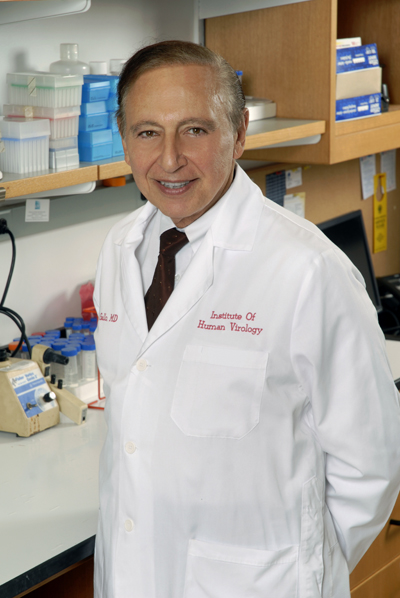November 11, 2015

Baltimore-based Institute leads collaborations to prevent, detect and treat infectious diseases in West Africa
The Institute of Human Virology (IHV) at the University of Maryland School of Medicine announced two significant grants comprising $13 million to strengthen infectious disease laboratory capacities and infrastructure in Kenya, and $10 million to enable early detection and rapid responses to new and emerging infectious disease threats in Nigeria. This announcement follows recent IHV milestones including surpassing more than 1 million patients in overseas care and treatment, a $50 million grant in Zambia, and a $24.5 million grant in Botswana to combat each country’s HIV/AIDS epidemics.
“IHV continues to serve as a true global leader who can effectively partner with varying foreign governments and public-private sector entities to combat infectious disease,” said Robert C. Gallo, MD, the Homer & Martha Gudelsky Distinguished Professor of Medicine and Director of the Institute of Human Virology. He continued “IHV’s Clinical Division under the leadership of my colleague and fellow IHV co-founder, Dr. Robert Redfield, works to advance global public health for the betterment of mankind and to save countless lives.” Dr. Gallo is most widely known for his co-discovery of HIV as the cause of AIDS and development of the HIV blood test.
The five-year $13 million grant for Kenya, led by Sylvia Ojoo, MB, ChB, Assistant Professor of Medicine at the Institute of Human Virology, was awarded by the U.S. Centers for Disease Control and Prevention (CDC), and supports a partnership led by IHV including Kenya’s Ministry of Health, the National Public Health Laboratory Services, and the Kenya National Blood Transfusion Service, among others. The collaboration named Boresha Maabara, which is Swahili for “improve laboratory services,” will streamline government laboratory guidelines and policies to strengthen effectiveness in diagnostic testing for the prevention, surveillance, and treatment of infectious diseases such as HIV and Tuberculosis, among other HIV-related opportunistic infections. “Dr. Ojoo continues to excel in building effective partnerships with the Kenyan Ministry of Health in order to improve the health of Kenya,” said Robert R. Redfield, Jr., MD, Professor of Medicine and Division Head, Clinical Care and Research at the Institute of Human Virology.
Additionally, the U.S. Government has a new priority initiative led by the CDC to address growing concerns related to biosecurity in Nigeria. Global gaps were highlighted in the recent Ebola outbreak in West Africa. Building on IHV’s extensive global experience, CDC awarded IHV a five-year $10 million grant to partner with CDC-Nigeria and the Nigerian Ministry of Health to build in-country capacity and expertise to detect biosecurity threats early, and to respond rapidly and effectively to emerging infectious disease threats, such as Ebola.
“This a great opportunity for the IHV to build on our longer-term CDC partnership established by the U.S. President’s Emergency Plan For AIDS Relief (PEPFAR), and to extend our expertise to help operationalize programs targeting viruses of biosecurity importance,” said Dr. Redfield. “Kenya and Nigeria each have a high burden of HIV, and remain at significant risk for additional epidemics which are dependent on successful biosecurity infrastructures that these awards will help provide.”
In Kenya, the IHV’s Division of Clinical Care and Research already leads a team, in partnership with Kenya’s Ministry of Health and the University of Nairobi, which is creating and implementing what has proven to be a paradigm shift in the health workforce of HIV-related training by developing a national HIV integrated training course. The onsite course replaced more than 20 disparate curricula, reducing time away from work for training. The course was piloted and is currently being rolled out nationally, positioned to cut the unit cost of training by about tenfold.
In Nigeria, in addition to the IHV Division of Epidemiology and Prevention’s work with the Institute of Human Virology, Nigeria, the IHV Clinical Division has already successfully facilitated the launch of HIV/AIDS training hubs in 13 training institutions for nurses and community health extension workers and 44 military hospitals in Kaduna State. The IHV also currently incorporates HIV/AIDS topics in curriculum for MPH students, and launched a short course in HIV/AIDS for Doctors of the University of Nigeria.
About the Institute of Human Virology
Formed in 1996 as a partnership between the State of Maryland, the City of Baltimore, the University System of Maryland and the University of Maryland Medical System, IHV is an institute of the University of Maryland School of Medicine and is home to some of the most globally-recognized and world-renowned experts in all of virology. The IHV combines the disciplines of basic research, epidemiology and clinical research in a concerted effort to speed the discovery of diagnostics and therapeutics for a wide variety of chronic and deadly viral and immune disorders - most notably, HIV the virus that causes AIDS. For more information, visit www.ihv.org and follow us on Twitter @IHVmaryland.
Contact
Office of Public Affairs
655 West Baltimore Street
Bressler Research Building 14-002
Baltimore, Maryland 21201-1559
Contact Media Relations
(410) 706-5260

